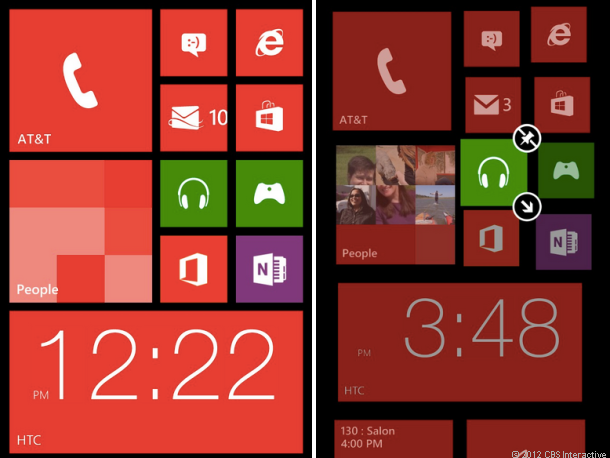
Windows Phone 8’s start screen with resizable live tiles.
(Credit: Screenshot by Jessica Dolcourt/CNET)
Microsoft is already facing lawsuits related to the just-launched Windows, with an operating system technology designer accusing Microsoft of ripping of its patent for “tiles.”
SurfCast, in a complaint filed yesterday in a U.S. District Court in Maine, said Microsoft infringes one of its four patents — No. 6,724,403 — by “making, using, selling, and offering to sell devices and software products” covered by SurfCast’s patent. That includes mobile devices using the Windows Phone 7 and Windows Phone 8 operating systems as well as PCs using Windows 8/RT.
The company also said Microsoft is contributing to infringement by encouraging developers to make app tiles for the Windows Store.
SurfCast is asking the court to decree that Microsoft has directly and indirectly infringed on its patent, and it wants Microsoft to “account for and pay to SurfCast all damages caused to SurfCast by reason of Microsoft’s patent infringement.”
Live Tiles are a feature of Microsoft’s redesigned operating system officially launched this month. They reside on the phone’s start screen and can contain real-time information. Users can “pin” Live Tiles of people (their tweets, photos, etc.), song, Web sites, photos, e-mail, notifications, Facebook and other items to the screen.
 SurfCast’s patent
SurfCast’s patent
(Credit: Screenshot by Shara Tibken/CNET)
SurfCast, however, said it thought of the technology first. Its Web site notes the company designed the “new concept” and filed for a patent related to “Tiles” in October 2000. The patent ultimately was issued in April 2004, and SurfCast said Microsoft knew about it when it filed its own patent application — No. 7,933,632 — related to Live Tiles.
“Microsoft had knowledge of the ‘403 patent at least as early as April 21, 2009,” SurfCast’s complaint said, as the software giant referenced the technology as relevant art during its patent application process.
Here’s how SurfCast describes Tiles on its Web site:
Tiles can be thought of as dynamically updating icons. A Tile is different from an icon because it can be both selectable and live — containing refreshed content that provides a real-time or near-real-time view of the underlying information.Tiles can provide dynamic bookmarking — an at-a-glance view of the current status of the program, file, or content associated with it.
Tiles enable people to have all their content, applications, and resources, regardless of whether on their mobile device, tablet, computer, or in their Cloud — visualized persistently — dynamically updating.
Via: CNET











